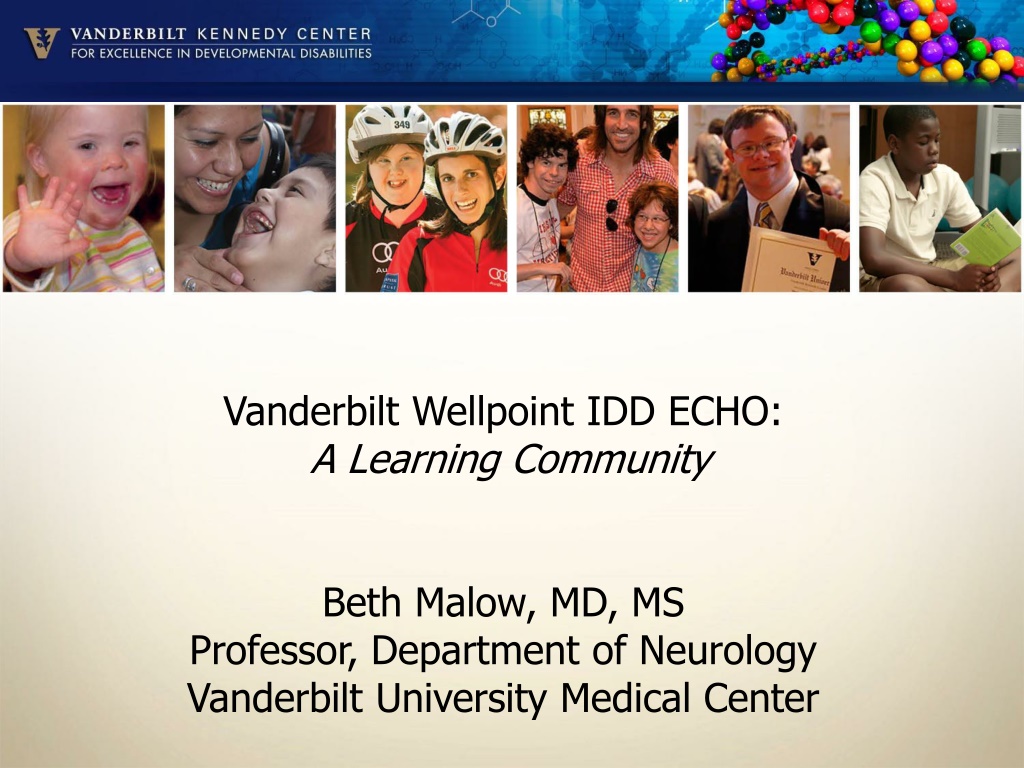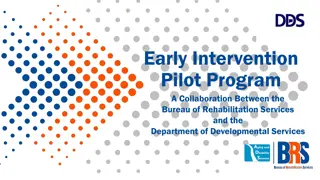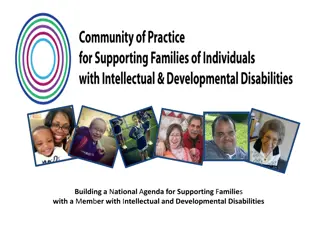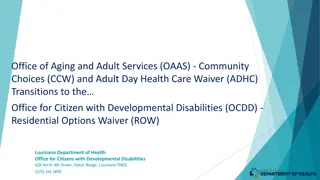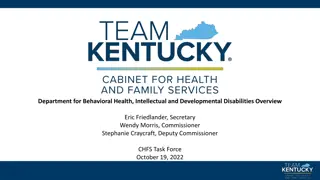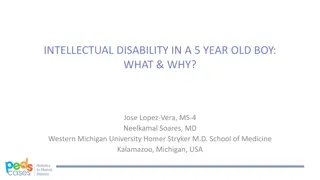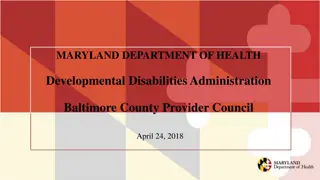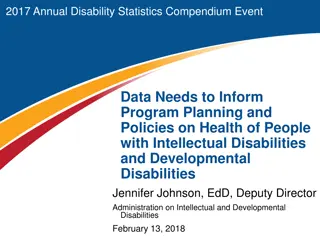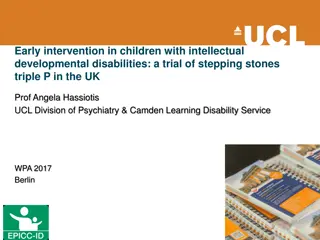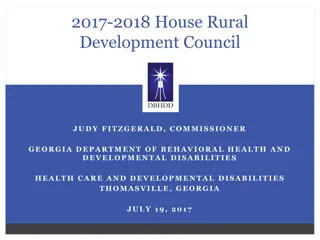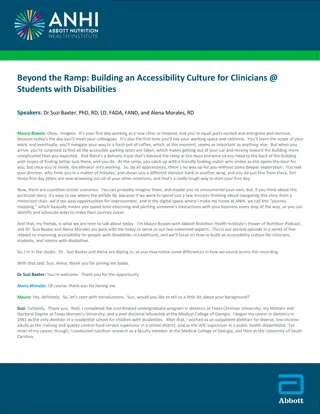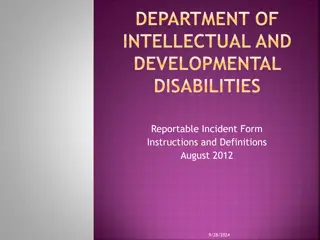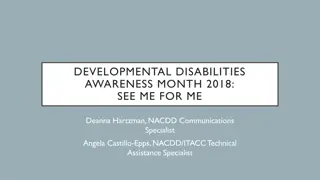Creating a Supportive Community for Clinicians in Intellectual and Developmental Disabilities Care
In this initiative led by Vanderbilt University Medical Center, clinicians caring for adults with intellectual and developmental disabilities come together on Zoom to support each other and enhance care for their patients. Through a collaborative platform resembling Project ECHO, participants present cases, engage in discussions, and receive recommendations in a structured format. The program aims to foster a learning community, improve patient outcomes, and provide a space for shared experiences and knowledge exchange.
- Community Support
- Intellectual Disabilities
- Developmental Disabilities
- Healthcare Collaboration
- Clinician Network
Download Presentation

Please find below an Image/Link to download the presentation.
The content on the website is provided AS IS for your information and personal use only. It may not be sold, licensed, or shared on other websites without obtaining consent from the author. Download presentation by click this link. If you encounter any issues during the download, it is possible that the publisher has removed the file from their server.
E N D
Presentation Transcript
Vanderbilt Wellpoint IDD ECHO: A Learning Community Beth Malow, MD, MS Professor, Department of Neurology Vanderbilt University Medical Center
What if We created a community On Zoom Where clinicians caring for adults with intellectual and developmental disabilities can support each other and the people and families we serve Extension for Community Healthcare Outcomes
Anatomy of an ECHO Welcome and Introductions Announcements and Housekeeping Items (no PHI) Patient Case Presentation Clarifying Questions Recommendations ECHO Lesson
The Case Presentation Presenters complete a case form with as much information as they are able We put together one simple slide summarizing the case
ID: 51-year-old white woman with phenylketonuria (PKU), moderate to severe intellectual disability and possible drug-induced leukopenia. She has unspecified psychosis and self-injuring behaviors for most of her adult life which have stabilized with atypical antipsychotic. CONSULT QUESTIONS Given persistent leukopenia noted since starting paliperidone, what can be done? Repetitive use of objects and insistence on inflexible routines (distress at minor changes), self-injury, challenging behaviors. Sensory-seeking. Headbanging (with significant injury) and elopement resulting in multiple ED visits have not recurred since starting paliperidone. Most recent ED visit related to behavior was 8/28/2019. Psychosis, environmental allergies, sleep disorder, anxiety, OCD, ODD Limited verbal skills, uses gestures and pictorials. Understands most communication. Lives in group home. Not in employment or education. Receives Medicare, Tenncare/ Medicaid, Primate Insurance. Has conservator. Greater than 50 hrs/week of support. None listed Symptoms Medical or mental health diagnoses Communication level Living situation, education, employment, financial status Social and recreational/community participation Psychotropic Medications Paliperidone (Invega Sustenna)- atypical antipsychotic 156 mg IM/month. Also Venlafaxine (Effexor) 150 mg ER, trazadone 100 mg twice daily for insomnia, diazepam 2 mg in am and 15 mg in pm, carbamazepine 100 mg twice daily, chlorpromazine (Thorazine) 400 mg twice daily Unsuccessful dose reductions attempted for carbamazepine, chlorpromazine, venlafaxine, and trazadone. None Self-injury and unintentional injury to others limits her participation in activities Therapies Other
Participants Come to sessions regularly with their camera ON, with their full attention and enthusiasm. Encouraged to invite staff from your practice as observers. Observers keep your camera off so participants can focus on each other.
Supporting adults with IDD during clinic visits in your practice Introduction to Pathfinder Management of medical conditions in adults with IDD Management of psychiatric symptoms and conditions in adults with IDD Enabling technology including assisted communication devices Government, housing & community supports for adults with IDD (including Pathfinder) Post-secondary education & employment Cultural competency and trauma-informed care Supporting families of adults with IDD including through aging Identifying autism in adults with IDD Supporting the self-advocate with IDD Self-determination and life skill and social skills development Relationships and sexuality
To date, we have completed an entire cohort, and will meet again for Cohort 2 starting in May 2024 (second and fourth Thursday of the month from 12- 1 pm Central Time) and running through Oct 2024 Practitioners include physicians, nurse practitioners, and licensed clinical social workers who accept Amerigroup (now Wellpoint) insurance Contact projectECHO@vumc.org if interested, or share our brochure with your loved ones clinicians!
Demographics of Participants Age Race Black of African American 21% White 79% Gender *We had one participant who identified as Hispanic, Latino, or Latina Male Female
Clinic Setting and Years of Practice for Participants How many years have you been practicing in your profession? In what type of setting do you complete the majority of your work?
Degree/Titles of Participants Counseling 4% MD 21% FNP 17% RN 4% DNP 13% MSN 29% MSW 12%
Evaluation/Research- Clinician Data Participants will complete a demographics survey at baseline (pre-training), a self-efficacy survey (pre- and post-training) and a satisfaction survey after training is completed. These are based on surveys used in previous ECHOs. Each participant will also identify a few key goals that they want to improve upon based on the ECHO training (e.g., learning about community resources, treating medical conditions, differential diagnosis related to mental health in population) and rate their progress post-ECHO. 1-not at all/minimal progress 2-some progress 3-fair progress 4-good progress 5-excellent progress
Initial Goals To become more competent in treating individuals with IDD and to recognize common issues they face when obtaining healthcare. To become better equipped to serve the IDD population of patients including assessment, treatment referrals, primary supports, and advocacy for the patient. To improve my ability to screen, recognize, diagnose, and treat individuals with IDD and co- morbid psychiatric disorders. To identify resources for patients and families to optimize their treatment outcomes
Based on the goals you set at the start of the project. How would you rate your progress?
Have you taken on any more patients in with I/DD since participating in this ECHO? Do you plan to?
Feedback from our participants You all have given me so many great resources that I have created a folder in my favorites just for IDD and now sharing with other providers at my clinic I felt like I was by myself trying to figure it all out. My nurse practitioner school did not provide IDD education I feel more confident in being able to provide the resources necessary for patients and their families to live the fullest life possible.
Evaluation/Research- Claims Data Wellpoint will provide us with deidentified aggregate data from each clinician enrolled related to their panel of IDD patients (1-year pre- ECHO and 1-year post-ECHO) including: Number of ED visits Number of hospital bed days Number of PCP visits per member Number of specialist visits per member Vaccinations Lipid Screening HbA1C < 8 (and how frequently ordered) Height and Weight (to calculate BMI) Mammograms May be able to tap into medication prescription databases
